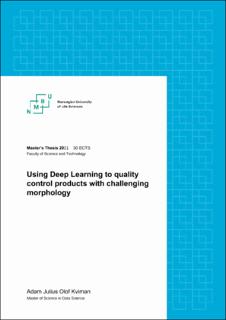| dc.contributor.advisor | Liland, Kristian Hovde | |
| dc.contributor.advisor | Tomic, Oliver | |
| dc.contributor.author | Kviman, Adam Julius Olof | |
| dc.date.accessioned | 2021-12-03T14:20:48Z | |
| dc.date.available | 2021-12-03T14:20:48Z | |
| dc.date.issued | 2021 | |
| dc.identifier.uri | https://hdl.handle.net/11250/2832834 | |
| dc.description.abstract | Automatic detection of faulty products saves companies around the world a tremendous amount of money each year. Sending out defective products to the customers can be devastating for a company’s reputation, depending on the type of defect sent out. One way to detect faulty products is to let a human control each product for any defects. Humans are good at detecting defects in most products; however, looking for the same defects for several hours each day is mentally exhausting. A machine is much more suited to these kinds defect finding tasks. Photographing the products and letting machine learning algorithms detect defects can get more consistent results since the machine will not lose focus. Depending on the type of product that is being examined, different types of problems will emerge. One common problem is that defects that are easy for a human to detect could pose a severe problem for a machine.
In this Master’s thesis, we will apply Deep-Learning algorithms to find defects in images taken of a product. NOW Electronics has developed a software solution using classical image detection algorithms. The software works well on many defects, but some defects prove hard to classify using classical methods. This thesis aims to compare Deep Learning methods to already implemented classical methods to see if using Deep Learning could improve the current classification system.
We find that using Deep Learning methods, we can make classification with the same level of performance as the currently implemented system. We are confident that with access to more training samples and further model tuning, the Deep Learning models will outperform the classical methods in both speed and accuracy. | en_US |
| dc.language.iso | eng | en_US |
| dc.publisher | Norwegian University of Life Sciences, Ås | en_US |
| dc.rights | Navngivelse 4.0 Internasjonal | * |
| dc.rights.uri | http://creativecommons.org/licenses/by/4.0/deed.no | * |
| dc.title | Using deep learning to quality control products with challenging morphology | en_US |
| dc.type | Master thesis | en_US |
| dc.description.localcode | M-DV | en_US |

